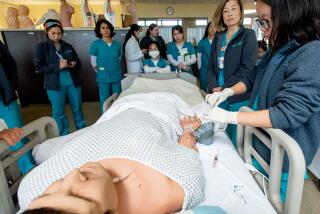MISSION VIEJO : Community Service Policy Considered
- Share via
Educators in the Saddleback Valley Unified School District formally introduced a policy proposal this week to make community service a requirement for high school graduation.
Under the proposal, which school board members will probably decide on in April, high school students would be required to complete a minimum of eight hours of community service with nonprofit agencies during their senior year as a condition of graduation.
The proposal has been in the works for about a year. The intention is to foster a sense of social responsibility, Assistant Supt. Barry Blade said, and it was inspired primarily by former President George Bush’s “1,000 Points of Light” idea of volunteerism.
“The board believes that community service can help students gain self-esteem, reinforce skills, discover career options and learn the value of volunteer work,” according to the draft policy statement. “Community service motivates students to learn by relating the curriculum to the needs of the community at large.”
Last September, the Laguna Beach Unified School District became the first public school district in Orange County, and one of a small number in the state, to make community service a graduation requirement. Beginning this school year, Laguna Beach seniors must complete 10 hours of community service work to receive their diplomas.
A similar requirement is under consideration in the Capistrano Unified School District.
During a meeting Tuesday, Saddleback Valley board members had many questions about how the requirement would work, asking what types of activities and agencies would count, what the requirement would cost, and what kind of liability the district could face. Before they make any decision, board members said, they want more opinions from students about how such a program would best work.
Board member Frank L. Ury said he believes that community service is a valuable goal but that core academic programs might be more deserving of extra attention at this point.
“In light of other budgetary cuts, I will have a hard time supporting this when other academic areas might need help,” Ury said. “I’m not sure this is a program that is something we want in lieu of other academic programs.”
The debate will continue March 9 during the next regularly scheduled board meeting.
More to Read
Sign up for Essential California
The most important California stories and recommendations in your inbox every morning.
You may occasionally receive promotional content from the Los Angeles Times.













